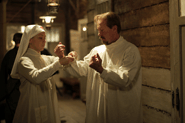Adapted from Mikhail Bulgakov’s collection of autofictional stories, A Country Doctor’s Notebook, Aleksei Balabanov’s Morphia is an unvarnished portrait of rural Russia at the cusp of the Bolshevik Revolution. Told from the perspective of an idealistic young doctor, Polyakov (Leonid Bichevin), Morphia retains the humor and texturality of Bulgakov’s prose to underscore Polyakov’s difficult and overwhelming adjustment to the isolation of life in the country where he has moved to serve as the region’s only physician. Still uncertain over his medical skills (often running back from the clinic to his nearby study in order to review textbooks on the medical procedures that he is about to perform) and struggling to cope with the backwardness of the community that often endanger his patients (in one episode, the parents of a girl suffering from acute asphyxia refuse to consent to an emergency tracheotomy, arguing that such a procedure would cause certain death), Polyakov finds unexpected respite in a morphine injection that had been administered by head nurse, Anna Nicolaevna (Ingeborga Dapkunaite) to treat an allergic reaction. However, as the demands of his job continue to mount, Polyakov’s dependence soon turns into full-blown addiction, leading him to increasingly desperate and reckless acts when a war-driven medical rationing threatens to cut off his supply. By emphasizing the intersection of personal and national history, Balabanov not only captures the social conditions that enabled the revolution, but also establishes Polyakov’s obsession and paranoia within the context of his seemingly more altruistic efforts to educate the rural community, not unlike the agitprop trains that toured the countryside to spread the gospel of the revolution (note that Polyakov is first seen arriving by train). In essence, by correlating Polyakov’s self-destruction with his idealism, Morphia also serves as a pointed allegory for the dysfunction that ultimately led to the collapse of the Soviet Union – a tragicomic denouement to a noble social experiment that, like the film’s flawed, well-intentioned hero, had lost its way.
© Acquarello 2010. All rights reserved
